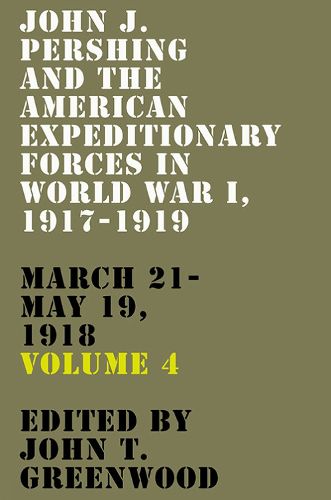Readings Newsletter
Become a Readings Member to make your shopping experience even easier.
Sign in or sign up for free!
You’re not far away from qualifying for FREE standard shipping within Australia
You’ve qualified for FREE standard shipping within Australia
The cart is loading…






General of the Armies John J. Pershing (1860?1948) had a long and decorated military career but is most famous for leading the American Expeditionary Forces in World War I. He published a memoir, My Experiences in the World War, and has been the subject of several biographies, but the literature regarding this towering figure and his enormous role in the First World War deserves to be expanded to include a collection of his wartime correspondence. Carefully edited by John T. Greenwood, volume 4 of John J. Pershing and the American Expeditionary Forces in World War I, 1917?1919 covers the period March 21?May 19, 1918, when General Pershing faced continuing controversies with the British and French political and military leaders who desperately sought American manpower to replace their mounting losses. Pershing's plans to build the AEF were disrupted after the long-anticipated German grand offensive struck the British front on the Somme on March 21, 1918, followed by a second German offensive on April 9. The German push radically transformed the Allied situation, changing the entire strategic orientation in the west within weeks. Under pressure to ensure the survival of the Allied coalition, and in discussion with Secretary of War Newton D. Baker and Gen. Tasker Bliss, Pershing set aside his plans for an independent American army under U.S. command and offered his available forces, whether fully trained or not, to Prime Minister Georges Clemenceau and Gen. Ferdinand Foch. In meetings on May 18 and 19 with Foch and Gen. Philippe Petain, respectively, Pershing once again stressed his plans for an American sector, and the two French generals agreed to the formation of such an army on the front once the present emergency had passed. Pershing's letters during this period convey a long and arduous struggle to build an American army at the front. Together, these volumes of wartime correspondence provide new insight into the work of a legendary soldier and the historic events in which he participated. AUTHOR: John T. Greenwood is former chief of the Office of Medical History, Office of the Surgeon General, U.S. Army. He is the editor of several books, including Normandy to Victory: The War Diary of General Courtney H. Hodges and the First U.S. Army and My Life before the World War, 1860-1917: A Memoir (written by John J. Pershing). He lives in Annandale, Virginia. 7 maps, 22 b/w illustrations, 14 b/w tables
$9.00 standard shipping within Australia
FREE standard shipping within Australia for orders over $100.00
Express & International shipping calculated at checkout
General of the Armies John J. Pershing (1860?1948) had a long and decorated military career but is most famous for leading the American Expeditionary Forces in World War I. He published a memoir, My Experiences in the World War, and has been the subject of several biographies, but the literature regarding this towering figure and his enormous role in the First World War deserves to be expanded to include a collection of his wartime correspondence. Carefully edited by John T. Greenwood, volume 4 of John J. Pershing and the American Expeditionary Forces in World War I, 1917?1919 covers the period March 21?May 19, 1918, when General Pershing faced continuing controversies with the British and French political and military leaders who desperately sought American manpower to replace their mounting losses. Pershing's plans to build the AEF were disrupted after the long-anticipated German grand offensive struck the British front on the Somme on March 21, 1918, followed by a second German offensive on April 9. The German push radically transformed the Allied situation, changing the entire strategic orientation in the west within weeks. Under pressure to ensure the survival of the Allied coalition, and in discussion with Secretary of War Newton D. Baker and Gen. Tasker Bliss, Pershing set aside his plans for an independent American army under U.S. command and offered his available forces, whether fully trained or not, to Prime Minister Georges Clemenceau and Gen. Ferdinand Foch. In meetings on May 18 and 19 with Foch and Gen. Philippe Petain, respectively, Pershing once again stressed his plans for an American sector, and the two French generals agreed to the formation of such an army on the front once the present emergency had passed. Pershing's letters during this period convey a long and arduous struggle to build an American army at the front. Together, these volumes of wartime correspondence provide new insight into the work of a legendary soldier and the historic events in which he participated. AUTHOR: John T. Greenwood is former chief of the Office of Medical History, Office of the Surgeon General, U.S. Army. He is the editor of several books, including Normandy to Victory: The War Diary of General Courtney H. Hodges and the First U.S. Army and My Life before the World War, 1860-1917: A Memoir (written by John J. Pershing). He lives in Annandale, Virginia. 7 maps, 22 b/w illustrations, 14 b/w tables